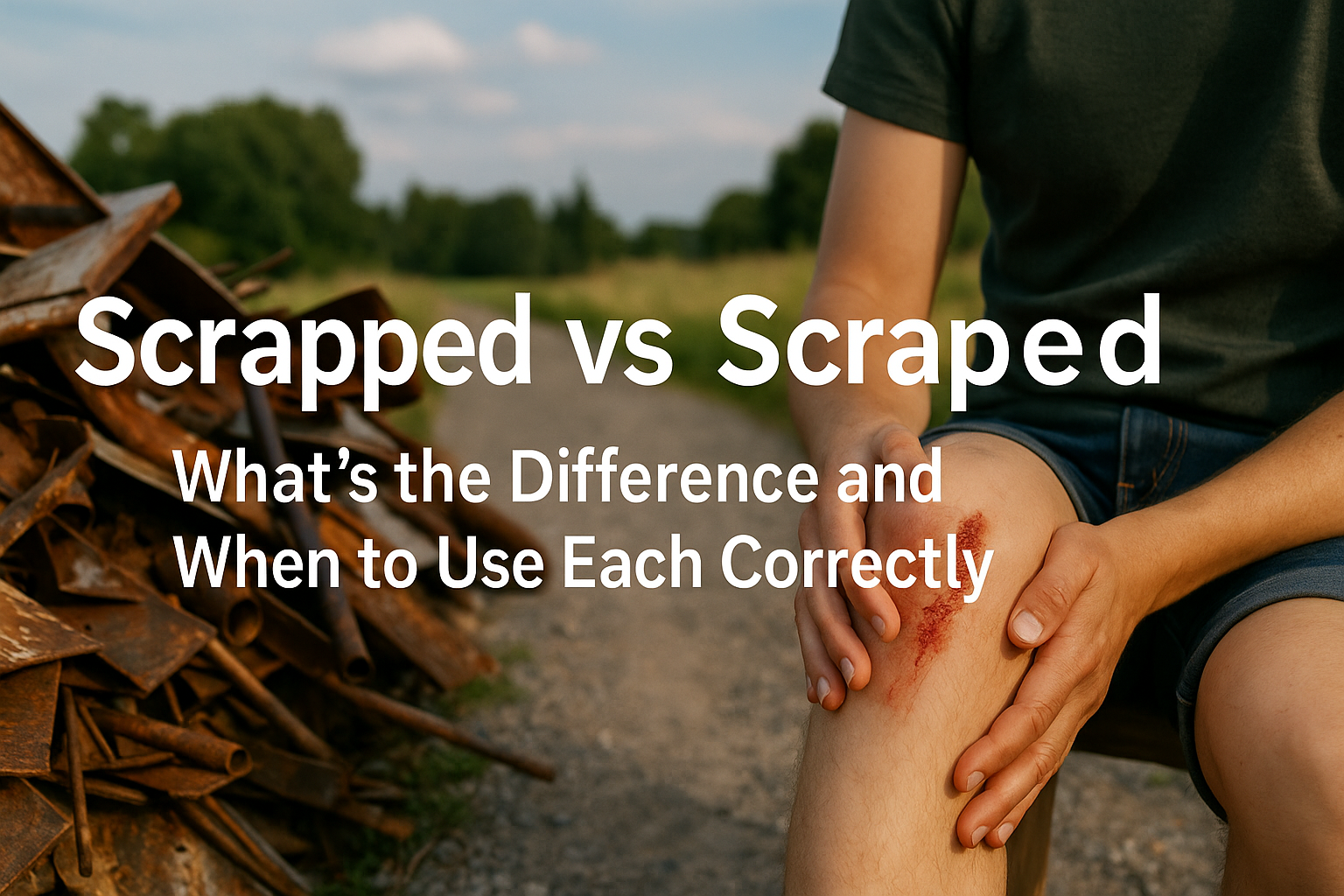Scrapped vs scraped trips up lots of writers—even seasoned ones. Though they look nearly identical, each word means something very different. And mixing them up can confuse readers or weaken your writing.
Quick Comparison Table
| Feature | Scrapped | Scraped |
|---|---|---|
| Part of Speech | Verb (past tense of scrap) | Verb (past tense of scrape) |
| Core Definition | Discarded, canceled, abandoned | Physically rubbed off, injured slightly, or scraped by |
| Typical Usage Context | Projects, plans, policies | Surfaces, cleaning, minor injuries, narrow successes |
| Emotional Tone | Negative (loss, abandonment) | Neutral or mildly negative (friction, effort) |
What Does “Scrapped” Mean?
- Definition of scrapped: To end, abandon, or discard something—especially plans, ideas, or policies.
- Uses:
- Business: “The board scrapped the marketing launch.”
- Engineering: “They scrapped the prototype after tests failed.”
- Media: “The show was scrapped after low ratings.”
Brain tip: When something is scrapped, it’s thrown into the trash of history.
Synonyms for scrapped: abandoned, discarded, jettisoned, eliminated, discontinued
Read More About This Article: Connector or Connecter: The Correct Spelling and Why It Matters
What Does “Scraped” Mean?
- Definition of scraped:
- To rub off material from a surface
- To suffer a slight injury from friction
- To narrowly achieve something (e.g. scraped through)
- Usage Examples:
- “I scraped my knee on the sidewalk.”
- “Scraped paint revealed bare wood.”
- “He just scraped through the exam.”
Synonyms for scraped: brushed, scoured, shaved, filed, raked
Difference Between Scrapped vs Scraped Explained
- Homophone confusion: They sound similar—same ending—but mean totally different things.
- Usage tip:
- If it’s about giving up or canceling → scrapped.
- If it’s about friction, injury, or barely succeeding → scraped.
Usage Tips (Quick)
- Scrapped = canned or thrown away
- Scraped = rubbed or grazed
- Scraped through = passed by the skin of your teeth
Origins of Scrapped and Scraped
- Origins of scrapped: Derived from Old Norse skrap (“scraps, waste”), later used as a verb by the 19th century.
- Origins of scraped: From Old English scrapan (“to scratch or scrape”), with Germanic roots.
Understanding their backgrounds makes it easier to keep each word straight.
Common Contexts & Examples of Usage
Examples of Scrapped:
- Corporate decisions
- Policy changes
- Abandoned ideas
Examples of Scraped:
- Physical injuries
- Paint or rust removal
- Narrow academic/personal success
Real-World Headlines:
- “Tesla scrapped its budget sedan prototype.”
- “Hiker scraped his leg after a fall.”
- “Startup scraped through funding rounds.”
Common Mistakes & Mini Quiz
Frequent errors: Writers mistakenly write “scrapped the paint” (meaning scratched) or “scraped the project” (meaning canceled)—both wrong.
Mini Quiz: Fill the blank with either scrapped or scraped:
- He ___ his old idea when funds ran out.
- The car door ___ against the wall.
- She ___ through the final round, pulling off a last-minute victory.
(Answers: 1. scrapped 2. scraped 3. scraped)
Bonus: Memory Tricks and Visual Aid
Visual mnemonic:
🗑️ Scrapped = Scrap it = toss it
🩹 Scraped = Scrape it = rub it
You can create a small diagram or infographic with this visual — readers love it and retain meaning better.
FAQs
- Can a project be scraped? No—that would mean a surface action. Projects are “scrapped.”
- What’s the difference between “scrape through” and “scrape by”? They’re nearly the same, both meaning narrowly pass.
- Is “scrapped” ever positive? Rarely—it usually means ending something, which carries negative connotations.
- Is “scraped” always bad? Not necessarily—it can be neutral (cleaning) or result in a minor injury.
Related Grammar Confusions
Check out these posts, which often confuse similar-sounding word pairs:
- Passed vs. Past
- Loose vs. Lose
- Affect vs. Effect
- Allude vs. Elude
Final Recap of Scrapped vs Scraped
- Scrapped = thrown away, canceled
- Scraped = rubbed, injured, narrowly passed
Use this article as your go-to guide when typing projects, injuries, or exam results related to scrapping or scraping. With practice, you’ll never mix them up again.

